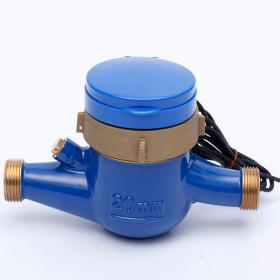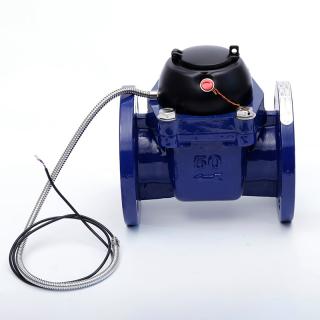
Water supports our daily life needs. The water meter records every drop of water consumed. Sensor water meters gradually replace traditional mechanical water meters with their unique technology, changing the operation mode and service model of the water supply system.

Traditional mechanical water meters rely on the water flow to drive the internal rotor or gear to rotate to count, and this mechanical transmission method inevitably has friction loss. After long-term use, small water flows are prone to be undercounted due to the inability to overcome the initial friction force, and the accuracy will gradually decrease.However, sensor water meters adopt a completely different electronic measurement principle. Commonly, there are non-contact technologies such as ultrasonic and electromagnetic. They precisely calculate the flow by measuring the speed of the water flow or sensing the signal generated by the water body cutting the magnetic lines of force. This method eliminates the influence of friction and can sensitively detect even tiny dripping water flows. The measurement accuracy is much higher than that of mechanical meters, especially in low-flow areas, its sensitivity advantage is extremely prominent. At the same time, they have relatively relaxed requirements for water quality and are less likely to get stuck or damaged by impurities in the water, with more stable and reliable measurement performance and significantly longer service life.
Sensor water meters are equipped with powerful electronic modules and communication units. They can accurately record instantaneous flow, cumulative water consumption, and other basic data, and can continuously monitor the working status. More importantly, through the embedded wireless communication module, these data can be automatically and regularly transmitted remotely to the data center platform of the water supply enterprise. This realizes true intelligent meter reading. Water supply enterprises can grasp the real-time and historical water usage data of each meter within the jurisdiction at any time, greatly improving operational efficiency and customer service level.

The core electronic measurement unit of sensor water meters usually adopts fully sealed packaging, isolated from the external environment, effectively resisting water vapor erosion and external physical impacts. At the same time, advanced sensor water meters have strong anti-magnetic interference functions. Even if an external strong magnet is used to attempt to interfere with the measurement, it can accurately detect such illegal behavior and record and report it, providing strong technical support for cracking down on water theft and ensuring fair measurement. Some high-end models also have reverse installation detection functions, capable of identifying whether someone is attempting to tamper with the reading by installing the water meter in reverse.
Sensor water meters can continuously collect high-precision water usage data and through the intelligent analysis system in the background, can identify abnormal water usage patterns of users. For example, continuous long-term presence of small but continuous flow often indicates the existence of an imperceptible hidden leak in the indoor pipes or water-using appliances. The system can automatically trigger a water leakage alarm, reminding users or water supply enterprises to promptly investigate and repair, effectively avoiding water waste and users' unnecessary economic losses.
| Aspect | Key Characteristics |
|---|---|
| Precision | Ultrasonic/electromagnetic contactless tech detects minute flows unaffected by friction or impurities |
| Comms | Wireless IoT enables remote data transmission eliminating manual reading |
| Security | Sealed anti-magnetic design with tamper detection ensures measurement integrity |
| Analytics | Continuous high-accuracy data enables leak detection and usage pattern analysis |
| Fundamental | Smart replacement for mechanical meters improving water management systems |